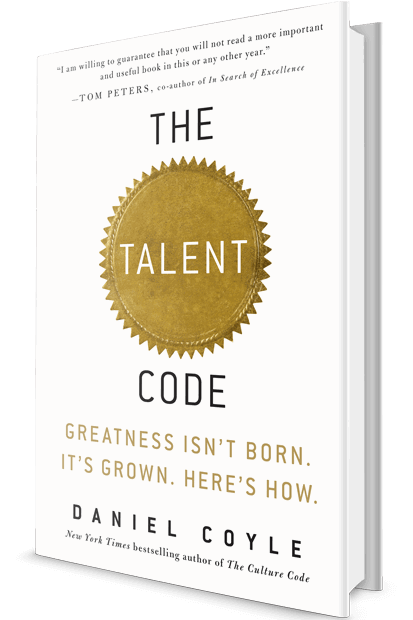Simple, Specific, Slow, Short, and Success - The Five "S"s of Great Practice
The Talent Code is a good book, but the message it preaches is quite simple: to become great at something, some ways seem to be better than others. Whether you're a violinist, a soccer player, or a tennis player, you can practice things in a way that makes you improve faster than mindlessly playing songs, kicking balls, or turning on the automatic ball server.

Take for example the story of a violinist that stood out to me. Upon learning a new piece, this violinist would play the notes without regard for pace, duration, tempo, or artistry. She'd take the sheet music and simply play the notes in the proper order. It rendered the song unrecognizable. When she encountered a tough part - a tough finger change or something - she'd slow down even more and practice that part again. She'd start at the beginning of the song, play through until she made a mistake, and restart. Each time she'd get farther into the song and the more she played a particular section the more like the song it would sound because she'd played it - correctly - tens or hundreds of times before.
This process took weeks. She might spend an hour working on a particular three-note sequence. Towards the end of the time she was technically proficient enough that she could use her "educated hands" to add "artistry" or "feeling" to the notes. The violinist succeeds fastest and makes the greatest progress by making thousands of tiny mistakes but instantly correcting them. This converts those thousands of errors into thousands of successes or, if you prefer, thousands of learning experiences. The violinist was constantly practicing at the edge of her ability, and in doing so, keeps expanding her talent's horizon.
Golfers, by and large, suck at practice. The better players will tend to do more than "hit some wedges to loosen up, then hit 50 drivers in a row and leave" but not much.
A guy was hitting some balls in our downtown building the other day. He's a +1 or so, and he was hitting the ball poorly. He said "I just don't have it today. It doesn't feel right." So why was he hitting balls? I doubt he could have told you. "Because" isn't a good answer! Instead of mindlessly hitting balls hoping to "find" something, we told this guy to work on a drill. Make the longest swing he could make, the fastest he could make it, feeling that it was completely under control and that felt right. If that was a four-yard chip shot, so be it. Build up from there. Practice at the edge of your ability, not beyond it. That day, this player's talent horizon had shrunk a bit, so he was doing himself no good practicing beyond the edge of it. He was learning nothing from his failures except that if he kept it up, he'd continue to fail. There was no learning, and thus, no success.
A near-scratch golfer responded that he hates working on the range because he feels like a 20 handicapper, and my response was perhaps a bit too firm in saying that he was practicing wrong. Oftentimes, I'll be perfectly happy to hit shanks, top the ball, hit it thin, or otherwise hit some terrible looking shots so long as I'm improving (or often exaggerating) certain moves. In that sense, the moves I'm making are equivalent to the violinist's fingerings, and the unrecognizable song is the shank or cold top.
I say "simple, slow, and short." I'm adding a fourth and a fifth "S" word to the list: "specific" and "success."
Simple - It's absolutely critical to boil down the thing you're working on to its most basic state.
Specific - "I want to improve my footwork" is not specific. "I want to bank my right foot inward more to prevent my right knee from kicking in towards the golf ball on my downswing" is better.
Slow and Short - These two go together and speak to practicing at the edge of your ability. If you're changing the way your right elbow works in transition, you're not going to do this at speed. If you're working on how your wrist hinges from P1 to P2, why swing past P2.5? Just swing to P2 - slowly - and chip the ball.
Success - If you can have a simple, specific idea, and practice it with slow and/or short swings at the edge of your ability, constantly making small mistakes with instant corrections, you'll have success with every swing you take.
One thing I didn't exaggerate in the post I made: when I'm working on something (which is virtually any time I'm not "warming up" for a round):
- My pace drops substantially. I'll hit one ball every few minutes. The time between is spent looking in the mirror, at the video, rehearsing a practice move, or thinking.
- I don't care about distance, direction, contact quality, etc. I'll almost never hit a ball over 75-80% of its normal distance. Most often, because I'm reasonably skilled, my shots will still be "okay" because I can "find the golf ball," but one of the best swings I've made (and posted) resulted in a cold shank. I have faith in my ability to change the swing and then very quickly "find the golf ball" again. Develop that faith in yourself, just as the violinist has faith in her ability to speed things up and still hit the notes.
When you're practicing properly, the song may be unrecognizable, but you're doing the right things and improving the fastest.
